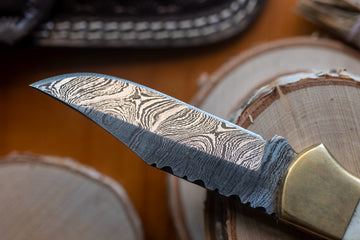
Introduction to the World of Damascus Knives
Damascus' knives, with their distinctive wavy patterns and renowned sharpness, have been a symbol of craftsmanship and artistry for centuries. But what exactly is a Damascus knife, and why has it gained such a reputation in the world of cutlery? Let's dive deep into the history, making, and unique features of these knives.
A Glimpse into the History
The name "Damascus" originates from the ancient city of Damascus in Syria. Historically, this city was a hub for trade and commerce, where weapons made from a unique steel known as "Wootz" were traded. These weapons, recognized for their strength and sharpness, were the precursors to what we now call Damascus knives.
The Distinctive Appearance
One of the most striking features of a Damascus knife is its wavy pattern on the blade. This pattern isn't just for show; it's a testament to the intricate process of forging and folding the steel multiple times, leading to hundreds, if not thousands, of layers.
The Making of a Damascus Knife
The creation of a Damascus knife is both an art and a science. It involves:
- Forging: Combining different types of steel.
- Folding: Repeatedly folding the steel to create layers.
- Etching: Treating the blade with acid to reveal the signature pattern.
Why Damascus Steel Stands Out
Damascus steel is not just about aesthetics. Its layered structure provides a combination of hardness and flexibility. This means that while the knife can retain a sharp edge, it's also less likely to break under pressure.
The Modern Evolution
While traditional methods of making Damascus knives are still in practice, modern techniques have also emerged. Today, many Damascus knives are made using powder metallurgy, ensuring even more strength and durability.
Caring for Your Damascus Knife
To maintain the beauty and functionality of a Damascus knife:
- Clean immediately after use.
- Sharpen using a whetstone.
- Oil the blade to prevent rusting.
Damascus Knives in Culinary Arts
Chefs around the world cherish Damascus knives. Their ability to maintain a sharp edge makes them perfect for precise cuts, and their beauty adds a touch of elegance to any kitchen.
Beyond the Kitchen
While Damascus knives are popular in culinary circles, they're also sought after for hunting, camping, and as collectibles. Their durability and sharpness make them versatile tools for various tasks.
Purchasing a Genuine Damascus Knife
Beware of imitations! A genuine Damascus knife is an investment. Look for:
- Reputable sellers: Ensure you're buying from a trusted source.
- Pattern consistency: The wavy pattern should be consistent and not just surface-deep.
- Price: Genuine Damascus knives are rarely cheap. If a deal seems too good to be true, it probably is.
Conclusion
A Damascus knife is more than just a tool; it's a piece of art with a rich history. Whether you're a chef, a collector, or someone who appreciates fine craftsmanship, owning a Damascus knife is a testament to quality and tradition. As with all things of value, ensure you care for it properly and purchase from reputable sources. In the world of knives, a Damascus blade truly stands out as a masterpiece.




